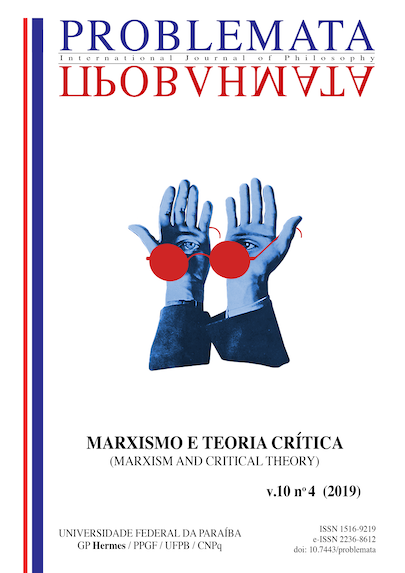MARCUSE AND THE UTOPIA OF LABOUR ABOLITION
DOI:
https://doi.org/10.7443/problemata.v10i4.49718Keywords:
Marcuse, Marx, Labour, Liberation, Activity for the sake of activityAbstract
The paper reconstructs the fundamental moments of Marcusian thought on the liberation of labour – from the early essay Über die philosophischen Grundlagen des Arbeitsbegriff to Zur Kritik des Hedonismus, till Eros and Civilisation and An Essay on Liberation. Marcuse tries, much more clearly than Marx, to overcome the dualism of the realm of necessity and the realm of freedom, in order to introduce the element of freedom and a sort of playful happiness into the very world of production. Liberation is conceived in terms of an “abolition” of the alienated labour, but at the same time as a mitigation of the weight of the purposeful or instrumental activities in favour of non-instrumental activities.
Downloads
Download data is not yet available.
References
ANDOLFI, F. Lavoro e libertà: Marx, Marcuse, Arendt. Reggio Emilia: Diabasis, 2004.
______. Il lavoro e il senso della vita. In: TOTARO, F. (Cur.). Il lavoro come questione di senso. Macerata: Eum, 2009. p. 351-363.
FREUD, S. Il disagio della civiltà e altri saggi. Torino: Bollati Boringhieri, 1971.
MARCUSE, H. Nuove fonti per la fondazione del materialismo storico. In: ______. Marxismo e rivoluzione. Torino: Einaudi, 1975. p. 63-116.
______. Sui fondamenti filosofici del concetto di lavoro nella scienza economica. In: ______. Cultura e società. Torino: Einaudi, 1969. p. 147-187.
______. Per la critica dell’edonismo. In: ______. Cultura e società. Torino: Einaudi, 1969a. p. 109-145.
______. Eros e civiltà. Torino: Einaudi, 1968.
______. Teoria degli istinti e libertà. In: ______. Psicanalisi e politica. Roma: Manifestolibri, 2006.
______. Liberazione dalla società affluente. In: LAING, R. D. et al. Dialettica della liberazione. Torino: Einaudi, 1969b. p. 177-193.
______. Saggio sulla liberazione. Torino: Einaudi, 1969c.
______. et al. Gespräche mit Herbert Marcuse. Frankfurt a.M.: Suhrkamp, 1978.
ROBINSON, P. La sinistra freudiana. Roma: Astrolabio-Ubaldini, 1979.
ZILBERSCHEID, U. Jenseits der Arbeit: der vergessene sozialistische Traum von Marx, Fromm und Marcuse. Frankfurt a.M.; Berlin; Bern; New York; Paris; Wien: Peter Lang, 1999.
______. Il lavoro e il senso della vita. In: TOTARO, F. (Cur.). Il lavoro come questione di senso. Macerata: Eum, 2009. p. 351-363.
FREUD, S. Il disagio della civiltà e altri saggi. Torino: Bollati Boringhieri, 1971.
MARCUSE, H. Nuove fonti per la fondazione del materialismo storico. In: ______. Marxismo e rivoluzione. Torino: Einaudi, 1975. p. 63-116.
______. Sui fondamenti filosofici del concetto di lavoro nella scienza economica. In: ______. Cultura e società. Torino: Einaudi, 1969. p. 147-187.
______. Per la critica dell’edonismo. In: ______. Cultura e società. Torino: Einaudi, 1969a. p. 109-145.
______. Eros e civiltà. Torino: Einaudi, 1968.
______. Teoria degli istinti e libertà. In: ______. Psicanalisi e politica. Roma: Manifestolibri, 2006.
______. Liberazione dalla società affluente. In: LAING, R. D. et al. Dialettica della liberazione. Torino: Einaudi, 1969b. p. 177-193.
______. Saggio sulla liberazione. Torino: Einaudi, 1969c.
______. et al. Gespräche mit Herbert Marcuse. Frankfurt a.M.: Suhrkamp, 1978.
ROBINSON, P. La sinistra freudiana. Roma: Astrolabio-Ubaldini, 1979.
ZILBERSCHEID, U. Jenseits der Arbeit: der vergessene sozialistische Traum von Marx, Fromm und Marcuse. Frankfurt a.M.; Berlin; Bern; New York; Paris; Wien: Peter Lang, 1999.
Downloads
Published
2019-12-16
Issue
Section
COLABORADORES INTERNACIONAIS
License
Authors who publish with this journal agree to the following terms:
- Authors retain copyright and grant the journal right of first publication with the work simultaneously licensed under a Creative Commons Attribution License that allows others to share the work with an acknowledgement of the work's authorship and initial publication in this journal.
- Authors are able to enter into separate, additional contractual arrangements for the non-exclusive distribution of the journal's published version of the work (e.g., post it to an institutional repository or publish it in a book), with an acknowledgement of its initial publication in this journal.
-
- Authors are permitted and encouraged to post their work online (e.g., in institutional repositories or on their website) prior to and during the submission process, as it can lead to productive exchanges, as well as earlier and greater citation of published work (See The Effect of Open Access).





